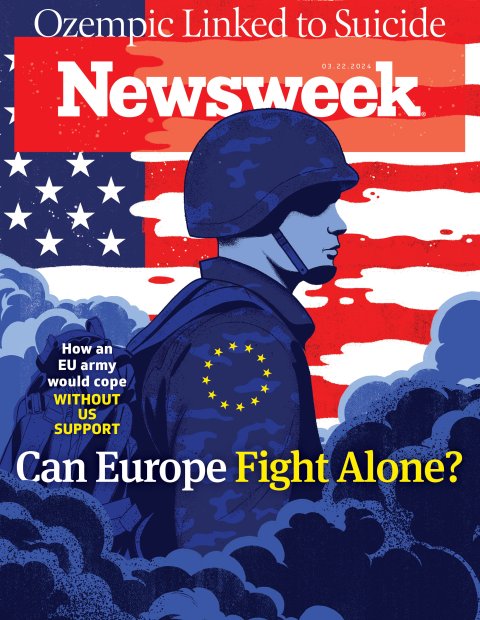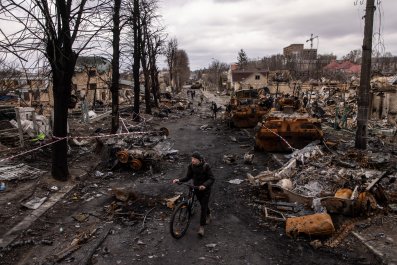A pipe dream, a fantasy—just two of the phrases bandied about whenever the idea of a European or European Union army resurfaces. This time, it was Italy's foreign minister, Antonio Tajani, who prodded the conversation awake. "If we want to be peacekeepers in the world, we need a European military," Tajani told Italy's La Stampa newspaper in early January. "This is a fundamental precondition to be able to have an effective European foreign policy."
The concept is bound up in complications from the get-go. There is no harmony on even the terminology. Would this be a European force, or one only open to European Union members? Would it be just an army, or a fully-fledged military with all the air, sea and land capabilities that come with it?
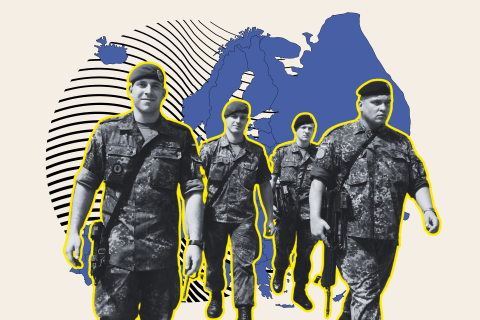
"It's never really come anywhere near anything real," former NATO official Edward Hunter Christie told Newsweek. But times are changing. War has raged in Ukraine for two years, and many NATO countries, including EU member states, have had a nasty wake-up call following years of lax defense spending. Comments from former president Donald Trump, the front-runner for the Republican presidential nomination, have fueled a reevaluation of just how much Europe relies on the U.S. for its military strength. Speaking during a rally in South Carolina in February, the GOP favorite suggested the U.S. would not shield fellow NATO members who had fallen behind on defense spending.
In fact, he would "encourage" Russia to strike at these military partners.
"NATO was busted until I came along," Trump told the rally. "I said, 'Everybody's gonna pay.' They said, 'Well, if we don't pay, are you still going to protect us?' I said, 'Absolutely not.' They couldn't believe the answer."

The words came as an anxiety-inducing splash of cold water in the face of America's European allies. With just a few sentences, the possible future U.S. leader undermined NATO's "all for one and one for all" Article 5, the bedrock of the alliance.
"This is a more severe warning shot than we've had in quite some time," Christie said.
Washington has been pressing Europe to invest in its military capabilities for decades and would rejoice at Europe building up its own stocks of what the U.S. currently provides for the continent, Kurt Volker, former U.S. Ambassador to NATO, told Newsweek.
Meanwhile, European NATO countries are broadly eager to keep the U.S. tied to continental defense, and remain largely convinced of Washington's commitment. Berlin, for one, "is confident in America's role in the transatlantic partnership, a foundation of our freedom and prosperity," a spokesperson for Germany's defense ministry told Newsweek. "Now and in the future. The ties between the U.S. and Europe are strong and reliable."

Several European defense ministries told Newsweek that Europe must build up its military power, and quickly, though it appears to have no intention of operating without the U.S.
But if NATO's dominant nation turned away from the commitment to defend any country in the alliance with all its might, Europe would need to be able to protect itself and quickly. So, could it?
What Would a European Army Look Like?
"Defining what a European army would be and what it would look like is the first hurdle in making a move towards a functioning European army, and is a hurdle that is difficult to pass," William Freer, a research fellow with the U.K.-based Council on Geostrategy, said.
"The theory sounds great, except that the theory always founders on the rocks of reality," retired U.S. Army General and former CIA Director David Petraeus told Newsweek on the sidelines of a lunch event organized by the Victor Pinchuk Foundation, during the Munich Security Conference in Germany.

Two main options emerge. Each state could disband its forces, funneling its military strength into a larger, common super-force. Experts are skeptical this would happen—national interests and deep attachments to sovereignty will likely always prevail.
"It's very, very unusual to try to merge your armed forces with those of another state," Christie said.
Or the member states could offer up a chunk of resources to a common pool, much like how NATO operates. There's more precedent, too: there is already an EU military staff; Germany and the Netherlands have integrated brigades; and outside of the EU, the U.K., which left the bloc following the Brexit vote in 2016, has the Joint Expeditionary Force with several states including Latvia, Norway, Estonia and the Netherlands. Pockets of regional collaboration exist, such as Nordic Defence Cooperation, also known as NORDEFCO, and some form of European military could build on preexisting structures.
The EU already has battlegroups, or units of around 1,500 personnel from different nations, with their deployment only greenlit by a unanimous decision from the European Council. But even the EU concedes its failings. "Issues relating to political will, usability, and financial solidarity have prevented them from being deployed," the bloc said.
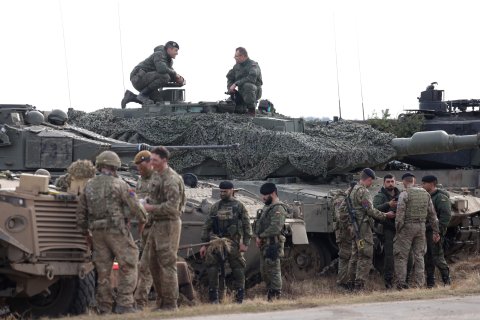
"There's no consensus," said Ed Arnold, research fellow for European security at the London-based Royal United Services Institute (RUSI) think tank.
Who Would Lead?
Without Washington to prod along major defense decisions, the picture of leadership of an exclusively European force is murky. The default leaders would traditionally be France and Germany, experts suggest. The German defense ministry told Newsweek that Berlin was "ready to take a leading role" and to do "even more in the future," but couched its comments firmly in a NATO context.
Crucially, France would be the only nuclear power, but analysts note that in any European military, there would need to be frank, clear discussions about just when Paris would be willing to leverage its nuclear arsenal for the protection of the group, and exactly which states it would defend.
Poland is ascendant, a burgeoning military power on the eastern flank, staring down Russia, that is set to become "the largest and most capable land army" in Europe, said William Alberque, director of strategy, technology and arms control at the International Institute for Strategic Studies (IISS) and a former NATO official.
Poland is already far ahead of both France and Germany in defense spending, when measured as a percentage of its gross domestic product (GDP), and will be spending "close to 4 percent," Polish Foreign Minister Radosław Sikorski said in late February. "If Putin really threatens us, we will double it," he told CNN. The Polish Defense Ministry in a statement told Newsweek: "Poland does not neglect EU actions in the security and defense area."
A strictly EU force would mean discounting the U.K. and its nuclear deterrent. However, "the U.K. would want to help shape how this European army was established," and most European countries would court British involvement, particularly for its naval power and nuclear weapons, Freer argued.
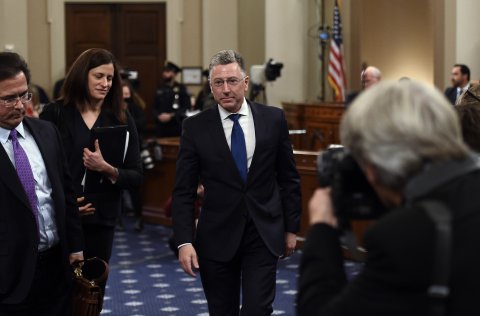
EU vs. NATO
Another critical consideration is where NATO stands. In a world of a strong NATO, a European army woven in EU structures "would risk duplicating not only the role of NATO forces but also the bureaucracy" without offering any additional military strength to Europe, said Freer. Without NATO, the EU or a collection of European countries could use the bones of the alliance for the skeleton of a new force in NATO's image.
"But it may struggle to inherit the role," Freer said. "A European army would look like NATO without the U.S., and so it could not possibly hope to fulfill the same role without a massive increase in defense spending from European states."
The U.S. has shouldered expensive military burdens in Europe for years, including providing logistics, airlift, communication, intelligence and reconnaissance capabilities. Without the U.S., European countries would have to provide this themselves — something that would come with a painful price tag and would hamper European efforts to beef up other parts of its military strength, RUSI's Arnold noted.
The U.S. leads NATO because it has capabilities few others possess, from refueling, space-based intelligence, and logistics to other enablers, Volker said. "It all comes down to capability."
"Right now, there's no European military that can conduct sustained, out-of-area combat operations," Alberque added. The EU knows this.
"Persistent underinvestment and insufficient European cooperation have created substantial defense capability gaps," the European Defense Agency conceded in November 2023.
"We have to take into account that the U.S. will focus more on the Indo-Pacific region in the future," a spokesperson for Berlin's defense ministry told Newsweek. "This means that Europe will have to take more responsibility for its security, regardless of the outcome of the U.S. election."
With NATO still in the picture, then, an EU or European military is more likely to be shorthand for upped defense spending across Europe, and the continuation of pushes already in motion to bring EU countries in line with NATO's target of 2 percent of GDP for defense spending.
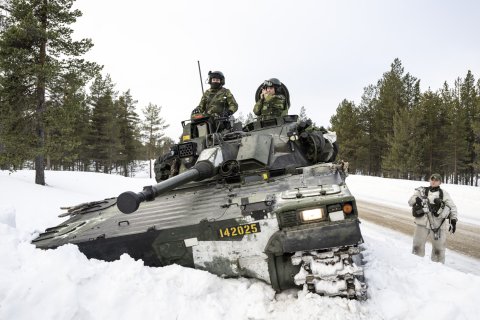
But the acknowledgment that Europe is behind is there. "The European Union urgently needs to assume more responsibility for its own security by acting in its neighborhood and beyond," the European Parliament said in a resolution in April 2023.
Can Europe Go It Alone?
Ultimately, Europe has little appetite for branching out on its own. Keen to harmonize and invest in defense, a European army is unlikely to get off the ground while NATO is going strong. "NATO remains a cornerstone of European security," Warsaw told Newsweek. "We need to focus on tightening cooperation between the EU and NATO."
With the U.K. out of the EU and the likes of Finland and Sweden committing wholeheartedly to NATO after Russia's invasion of Ukraine, "the idea of a European military structure separate from NATO makes less sense than it did a year ago or two years ago," Alberque said. Key players are still reticent to entertain the idea. "There is no such initiative," the French armed forces ministry told Newsweek in a statement in early March.
But "the time is never wrong" for Europe to knuckle down and build up its military might, Volker added. A European military with the capabilities Europe has today may lack the oomph of a U.S.-led NATO, but it's not powerless, and Europe is looking to shift off the back foot.
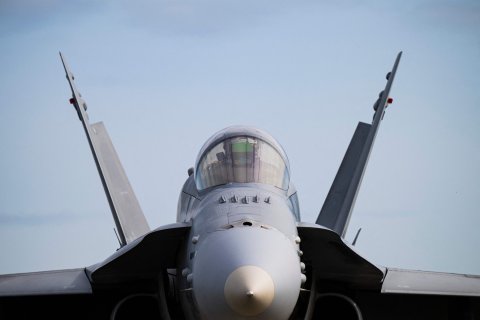
"As far as Europe is concerned, increased interoperability and synchronization among European nations is paramount," Berlin said. But this is all bracketed by the NATO context. Germany added: "Our clear objective is to strengthen NATO's European pillar. It is not a question of whether Germany, France or Britain should take the lead."
In early March, top EU officials revealed plans to spend more than $1.6 billion to bolster the bloc's arms industry and intra-bloc trade. "Member states need to invest more, better, together, and European," the European Commission said.
Dutch Defense Minister Kajsa Ollongren went further. She told Newsweek the EU needs to remove national barriers to help move troops and military goods seamlessly across borders.
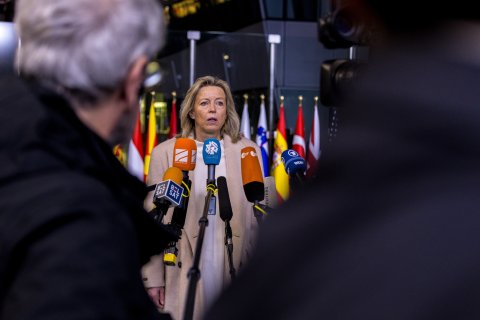
"A European Commissioner for Defense in the next European Commission is key for a safer and stronger Europe. If not now, when? National interests do not make us stronger," Ollongren added.
But will that be enough to fill the void if a Trump-led White House decided the U.S. will pull the plug on NATO?
"Europe will have to take more responsibility for its security, regardless of the outcome of the U.S. election," Berlin said.
The penny has dropped in Europe, but there are big questions over how long it will take to get European defense spending, and its capabilities, up to scratch. The delivery will take time, said Douglas Barrie, a senior fellow for military aerospace at the IISS. If U.S. support evaporated tomorrow, Europe would stare down real gaps in capabilities like land-based air and missile defense, as well as in intelligence, surveillance and reconnaissance, Barrie told Newsweek.
Around 80 percent of NATO's defense spending pours in from non-EU NATO allies, added Arnold. "Unless there's a serious rebalancing of the burden-sharing, it is unlikely that a credible European military force can 'go it alone' without the US."
